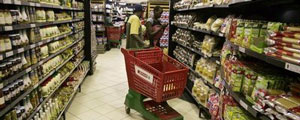
LIFE has become tough for the majority of Zimbabweans in the past four months owing to a shortage of locally-produced basic commodities that has seen most people living on less than $2 a day, Finance minister Tendai Biti said yesterday. The shortage has also seen Zimbabweans increasingly unable to sustain themselves.
Report by Bernard Mpofu
According to Biti, a shortage of some basic commodities has pushed up Zimbabwe’s food inflation for the month of March despite a slowdown in general year-on-year price increases.
Food inflation, according to Biti, has been on the rise despite a weakening South African rand. A general shortage of cash on the market has also not helped matters.
Presenting his first quarter State of the Economy report in Harare yesterday, Biti said depressed capacity utilisation of the local manufacturing sector, compounded by an underperforming agriculture sector in recent months, pushed food prices up, making life unbearable for millions of Zimbabweans.
In January and February, inflation stood at 2,5% and 2,98%, respectively.
“We are on course for inflation, but what we are worried about is food inflation and some will say, why is our inflation low?” Biti said.
“There has been an upward spike in food inflation (0,44 points in March from 0,32 points in February). Food inflation has been on an upward spike.
- Chamisa under fire over US$120K donation
- Mavhunga puts DeMbare into Chibuku quarterfinals
- Pension funds bet on Cabora Bassa oilfields
- Councils defy govt fire tender directive
Keep Reading
“We had a meeting with the retailers and manufacturers last week.
It’s clear that there is a shortage of cooking oil in the market and the manufacturers themselves cannot produce 50% of domestic demand. But it is also clear that as far as fats are concerned, Zimbabwe has 100% capacity. This includes things like margarine and so forth. It is also clear that there is a shortage of milk in this country. Our dairy herd has collapsed from a peak of 300 000 cows to about 96 000 which is not acceptable at all.”
The country, according to Biti, requires nearly seven million megalitres of milk per month.
“We also have a problem on baked beans due to the closure of Cairns Foods . . . We are definitely going to do something on the issue of cooking oil,” the minister said.
“There is a genuine case of shortages, so we are going to implement measures that will encourage freer importation of cooking fat in Zimbabwe and I will be announcing those measures shortly.”
According to the Consumer Council of Zimbabwe, the cost of living for a low-income urban earner for a family of six was last month estimated at $573,22.











